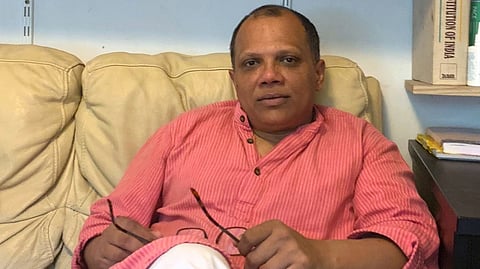Cambridge’s first Indian Mayor’s heart still throbs for homeland
Ajayan
Baiju's path is a tapestry of varied roles and achievements. A dedicated student of law, he has distinguished himself as a leading criminal and labour lawyer, councillor, deputy mayor and, as from last week, the Mayor. His active involvement in Cambridge's civic life also saw him shortlisted as a Labour Party candidate for the House of Commons last time. He also presides over the Indian Workers’ Union.
During his student days in Cambridge, Baiju was part of a union of Indian students affiliated to the Communist Party of India (Marxist), where he developed a close rapport with party secretary Sitaram Yechury. However, disillusioned by the disparity between the party's ideology and its actions, Baiju submitted his resignation directly to Yechury and subsequently got actively involved with the Labour Party.
In a candid conversation with Metro Vaartha at his Cambridge residence, Baiju Thittala, adorned in a mundu and kurtha, an attire he proudly dons even for council meetings, shared the journey that led him to politics, his plans as the first Indian Mayor of the city and his aspirations. Beside him, his youngest son, a fifth-grade student, listened intently to his father's words.
Excerpts from the interview:
What are your priorities for this city, celebrated as one of the world’s foremost centres of education, drawing people from every corner of the globe?
Cambridge is a beacon of learning and cultural confluence and is multifaceted. But it is one of those cities in Great Britain which has a very deep divide or inequality. The number of homeless here is astounding. The city, being a business hub too, has had the tradition of addressing the issues of the elite. Accessibility to quality education for all residents is paramount. Among my priorities is finding ways to raise funds for the homeless, those living on the streets in the harshest condition, and do away with discrimination of all sorts and create more green spaces for communal harmony. My mayoral theme is deep diversity, inclusivity and pluralism.
As a lawyer, what differences do you observe in the legal frameworks of the UK and India, particularly given your involvement with the labour movement and your experience addressing labour conclaves in India?
India urgently requires stringent reforms in its criminal justice, labour justice and public healthcare systems. Labour laws in India are antiquated, clinging to outdated colonial practices that were instituted shortly after independence. In both the UK and India, failure to pay minimum wages is deemed a criminal offence. However, the key distinction lies in the promptness of action - in the UK, such violations are swiftly addressed, whereas in India, enforcement often lags behind.
The divergence in criminal procedure between the two nations is stark. In India, statements made before the police may not be admissible or decisive in court, a remnant of colonial-era laws predicated on British distrust of native police officers. Conversely, in the UK, such statements hold significant weight in judicial proceedings. As society progresses, so too must our legal frameworks.
There is this noticeable trend in Kerala of students moving out in search of better education and employment prospects. Cambridge is a major education hub of the UK. What is your word of caution to Keralites?
It is the inadequacies of the system in Kerala that compel students to seek greener pastures, which often prove to be less verdant than they appear from afar. There must be a thorough understanding and careful assessment of the college, the course, and the prospects before taking such a significant leap. Personally, I have encountered numerous cases of students from India who found themselves ensnared in unforeseen challenges. Students wanting to move out should proceed with caution.
Now coming to your personal issues. You were shortlisted to be a candidate for the House of Commons last time. Elections are now round the corner. Will you be in the fray?
I was shortlisted as a Labour Party candidate last time from two to three constituencies. If I accept an offer now and become an MP, I'll be tied down in the UK. That’s not what I want. I grew up in a labour family in Arpookara in Kottayam district; left for Delhi at the young age of 18; tried my hand at several jobs there, married, and then joined my wife who had moved to the UK. My passion for law led me to graduate in law here, complete my post-graduation and undertake research in labour law.
Like many Indians here, I can continue leading a comfortable life, bolstered by my political status and a lucrative career as a leading lawyer. However, I am deeply inspired by Gandhiji, whom I hold in the highest esteem. Gandhiji, too, could have remained in South Africa but chose to return to India, altering the course of history. This is my guiding inspiration.
I yearn to return to my roots in a few years and actively contribute to the labour movement. I have already been addressing political conclaves in India and participated briefly in Rahul Gandhi's Bharat Jodo Yatra. Gandhian and Nehruvian philosophies guide me, and I remain in constant touch with prominent Indian politicians.
My ultimate goal is to transition my political journey from Cambridge to India, focusing on the national stage. Soon, my efforts will be dedicated to my homeland, where I aspire to bring about meaningful change and uphold the values that have shaped my life and career.


